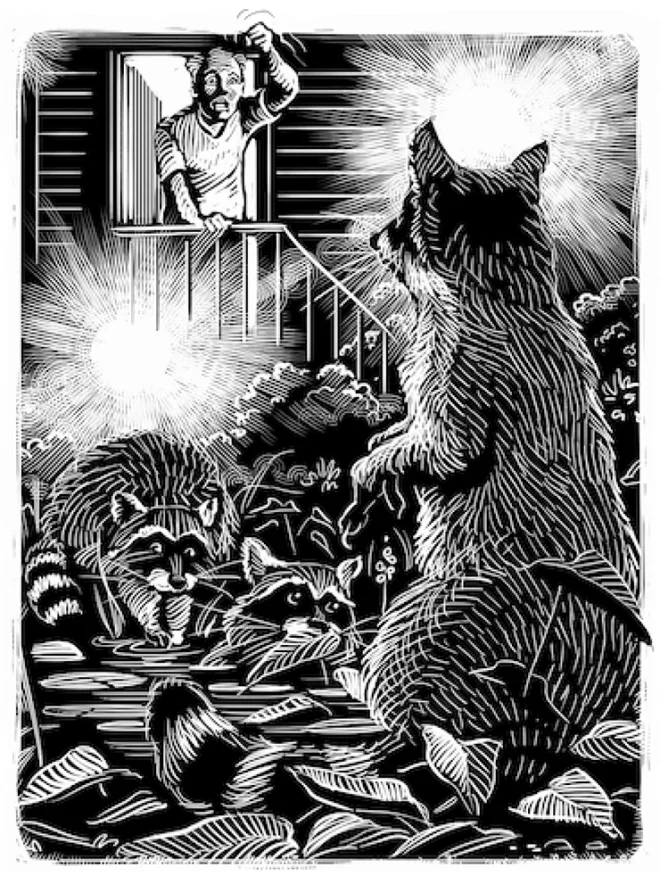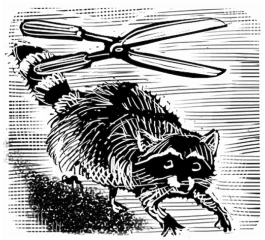
One Summer weekend, I installed a new pond in our front garden. I dug the hole, installed a liner, filled it with water, and stocked it with fish and water lilies. I spent a lot of money on that pond, anticipating a private paradise for attracting birds, frogs, and the like. Certainly, such a feature would burnish my standing in the neighborhood.
A few days after the pond was finished, the wife called me at work. “Hi honey, there are two raccoons floating on their backs in the pond eating your fish and plants. Oh…they look so cute! Just like otters.”
I raced home. Too late. The fish were gone. I had even named one of them. Spotty was a mottled, plump, lethargic goldfish. Too lethargic.
After I had introduced him to his new home, Spotty rose to the surface and ogled me with his pop-eyes. He’d oozed gratitude as I fed him fish flakes. Then the raccoons came. Lord rest poor Spotty’s soul.
Those varmints even pulled up my lilies and devoured them for their succulent bulbs—at $29.99 per tuber! A few red petals floated on the surface, like spots of blood. Then the rascals bit holes in the pond liner so that half of the water leaked out.
My nostrils flared with indignation. “This is war!” I declared. The missiles had lifted off. From here there’d be no turning back.
My first action was to install a motion-sensing floodlight over the pond. That night I waited in anticipation for the raccoons to arrive. A fine mist hung over water. At 2 a.m., the floodlight switches on, illuminating three raccoons. Garbed in my underwear and itching for action, I rush outside and peer at them from the front porch. Two of the buggers had waded into the water and are splashing around while another stands guard on the surrounding rockery. I yell at him from the porch: “Hey, you!” He stands on his hind legs and, with the lights reflecting in his red eyes, waves his little front feet at me like he is shadow boxing. What nerve. Who does he think he is, Rocky Balboa Raccoon? Then he hisses. He hisses!
This really gets my goat. I grab the nearest ballistic I can find—some steel garden shears left out on the porch—and launch them in his direction. The raccoon stares at the spinning shears like a deer in the headlights. I have to admit, I am an expert dart player even without the balancing effect of a pint of beer in my spare hand. The experience shows.

Bonk! The shears hit him flat in the forehead, bounce off, and splash into the pond. He tumbles backwards into the bushes. I raise my hands to my face and scream, “Nooo—I didn’t want to kill him!” My shoulders slump. I almost sob.
For a moment. Then the bushes rustle and, swaying, Rocky Balboa stands back up. He turns around to look at me. Our eyes lock. He bares his teeth. Instinctively, I bare mine. It’s as if I can read his thoughts—is that all ya got? Then they all turn tail and scramble up and over the yard’s picket fence. I watch them disappear into the darkness and reappear again in the haze of a streetlight. Like late-night carousers turned out of the pub, they rumble down the street as if they haven’t a care in the world. Finally, they vanish in the fog.
I need a better battle plan, so I Google something like “deter raccoons in the garden.” In my darkened den, dozens of entries light up the computer screen. Two promising tactics stand out.
The first idea is to sprinkle cayenne pepper around the pond and on any plants the raccoons might touch and sniff, thereby delivering a snoot full of pepper point-blank. Or at least get the irritant on their hands and then into their mouths, what with their obsessive hand cleaning. I think, Why not go for heavy weaponry? So I spread habañero pepper instead.
Alas, with every action comes equal and opposite collateral damage. In this case it was both my big-nosed dog, Mo, and the wife’s flower beds. Out for his morning sniff, Mo gets a full shot of pepper in his mucous membranes. He proceeds to bury his nose in the flower bed like a plowshare. Mo trenches deeply through a bed of petunias and about halfway through a row of carrots be-fore he surfaces for air. He sneezes twice and shakes his head so vigorously that his ears flip-flop and the collection of old dog tags on his collar jingle. Curiously, he seems to be smiling and quite pleased by his endeavor.
Not so the wife. She pronounces, “Well, that was clever. Now you owe me some weeding time.” I hate weeding.
This was a setback. I reach back into my internet arsenal and read number two—which is about using number one, “fox urine,” as a potential deterrent. It seems very organic. But expensive. Hmmm…I’d read Farley Mowat’s Never Cry Wolf and remember the part where Mowat marks the territory around his tent with his own urine to ward off intruding wolves. This strategy worked for Mowat—the wolves avoided his piddled perimeter like the plague. Great idea! I mean, what can go wrong?
In preparation, I drink a liter of cola about an hour before sunset, and then I wait. As darkness falls, I am more than ready to deliver my load. I stand by the pond, spigot in hand—just as the floodlamps light up the night. Oops. I forgot about that.
So here I am by the pond, exposed midstream in full view of Dorothy, our elderly neighbor whose kitchen window overlooks my yard. She is washing the dinner dishes in the sink when the beacon flares right on me.
Not long afterwards she puts her house on the market. Other neighbors start avoiding me, as well.
I soon discover a second problem with Mowat’s method: rac-coons are not wolves. Instead of shirking my territory, the lunatic creatures stake out their own claim to the pond. I unplug the betraying lamp and redouble my efforts. 7-Up probably wonders about the spike in their regional sales. Mo decides to join in the fun, as well.
Finally, the wife intervenes. “What on earth is that stink by the pond?” she says. I also had noticed the lemony stench with funky earth undertones. After I suggest what the reason could, maybe, possibly be—she threatens to snip the problem off at the bud with the aforementioned garden shears. That ends that, let me tell you.
The hostilities with the raccoons dragged on for a couple more years. They were unrelenting. More battles were fought. I won’t bore you with the details. I’ll let you know how it ended, though. In the Art of War, Sun Tzu said, “All warfare is based on deception. Let your plans be as dark and impenetrable as the night.”
With these words of wisdom, I executed my final plan. I submerged little mousetraps weighted down with stones in the darkness at the bottom of the pond to snap on my enemies’ feet. I am actually a naturalist and animal lover, so I modified the weapons so they won’t snap hard on their sensitive pinkies, but with just enough force to serve as an effective deterrent.
Sometimes late at night when I’d hear a curdling yowl rise from the garden, I’d peek out from behind the window curtain to see a miffed raccoon hobbling off clompity-clomp with a mousetrap attached to his foot, until the unwanted shoe slipped off.
Finally, though, I tired of replacing the traps and removing the occasional dead fish from them. Eventually I gave my pond over to the raccoons. Why? The real reason for my surrender was that there are so many of the four-footed hooligans. Let me fill you in on a little factoid. The population density of raccoons in cities like mine ranges from 130 to 390 raccoons per square mile. That’s a lot of raccoons. By my reckoning, if you lined up all the raccoons living in the greater Seattle metro area and had them join hands on the Interstate 90, they would stretch from here to Missoula. Think about that.
Now I sit on the front porch overlooking the pond and rub Mo’s gray belly with my bare foot. I love to watch his rear feet air-scratch imaginary fleas. With maturity I have come to realize that we are delusional to think we are the masters of our domain. You can place a feature in your garden to attract critters, but you can’t choose the critters you are going to attract. Often the damage that you inflict in fighting them is worse than the scourge itself. So my suggestion is that you relax and work around them—it is you who are living in nature’s world.
Best we get along as well as we can. ❖


 Previous
Previous

